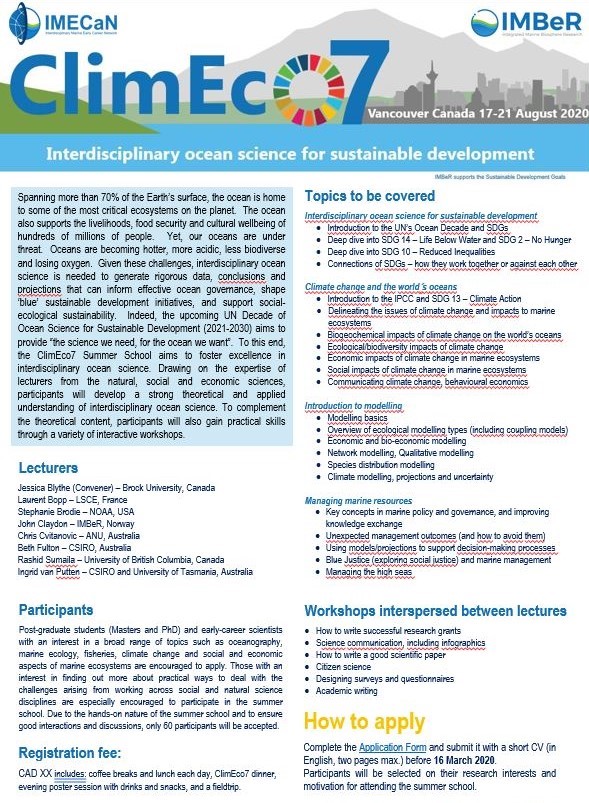
IMBeR ClimEco7: Interdisciplinary ocean science for sustainable development
Location: Vancouver, Canada
IMBeR's 'Climate and Ecosystems' Summer School
ClimEco7 is the seventh in a series of “Climate and Ecosystems” biennial summer schools organised by IMBeR, the Integrated Marine Biosphere Research project. ClimEco summer schools are designed for 60-70 post-graduate marine science students and early career researchers and are led by an interdisciplinary group of scientists, which includes leaders in their respective fields.
When and where
ClimEco7 will be held at the University of British Columbia (UBC) in Vancouver, Canada from 9-13 August 2021
Who can apply
Post-graduate students and early career researchers from any oceans science discipline and any country in the world!
Registration fee:
Students: $525 CAD
Early career researchers: $600 CAD
Registration fee includes: Lunch and coffee breaks each day, Ice-breaker dinner, drinks and snacks during the poster session and a subsidised fieldtrip
Accommondation and transport are not included.
Focus of ClimEco7
Spanning more than 70% of the Earth’s surface, the ocean is home to some of the most critical ecosystems on the planet. The ocean also supports the livelihoods, food security and cultural wellbeing of hundreds of millions of people. Yet, our oceans are under threat. Oceans are becoming hotter, more acidic, less biodiverse and losing oxygen. Given these challenges, interdisciplinary ocean science is needed to generate rigorous data, conclusions and projections that can inform effective ocean governance, shape ‘blue’ sustainable development initiatives, and support social-ecological sustainability. Indeed, the upcoming UN Decade of Ocean Science for Sustainable Development (2021-2030) aims to provide “the science we need, for the ocean we want”. To this end, the ClimEco7 Summer School aims to foster excellence in interdisciplinary ocean science. Drawing on the expertise of lecturers from the natural, social and economic sciences, participants will develop a strong theoretical and applied understanding of interdisciplinary ocean science. To complement the theoretical content, participants will also gain practical skills through a variety of interactive workshops.
Topics to be covered
Interdisciplinary ocean science for sustainable development
- Introduction to the UN’s Ocean Decade and SDGs
- Deep dive into SDG 14 Life Below Water and SDG 2 No Hunger
- Deep dive into SDG 10 Reduced Inequalities
- Connections of SDGs how they work together or against each other
Climate change and the world´s oceans
- Introduction to the IPCC and SDG 13 Climate Action
- Delineating the issues of climate change and impacts to marine ecosystems
- Biogeochemical impacts of climate change on the world’s oceans
- Ecological biodiversity impacts of climate change
- Economic impacts of climate change in marine ecosystems
- Social impacts of climate change in marine ecosystems
- Communicating climate change, behavioural economics
Introduction to modelling
Modelling basics
- Overview of ecological modelling types (including coupling models)
- Economic and bio economic modelling
- Network modelling, Qualitative modelling
- Species distribution modelling
- Climate modelling, projections and uncertainty
Managing marine resources
- Key concepts in marine policy and governance, and improving knowledge exchange
- Unexpected management outcomes (and how to avoid them)
- Using models projections to support decision making processes
- Blue Justice (exploring social justice) and marine management
- Managing the high seas
- Connecting marine science with policy and practice
Workshops interspersed between lectures
- How to write successful research grants
- Developing policy pitches and debrief
- Communicating science
- How to write a scientific paper
- Citizen science
- Designing surveys and questionnaires
- Academic writing
- Creating a qualitative model
- The role of virtual reality in accelerating thinking in ocean governance

